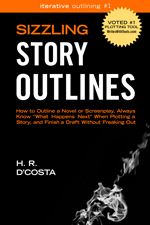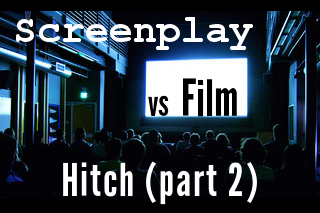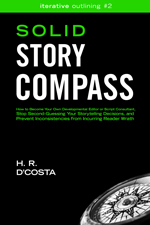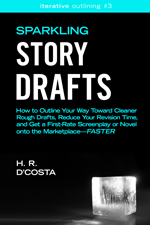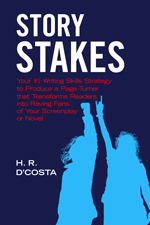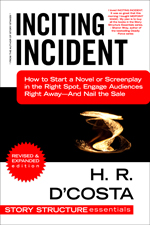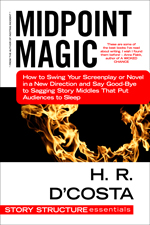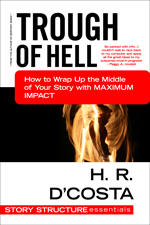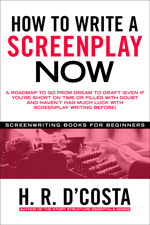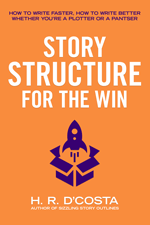Yesterday, I shared part one of the romantic comedy screenwriting tips I learned by comparing the screenplay and film versions of Hitch, the 2005 rom-com starring Will Smith as a “date doctor” who’s having difficulty wooing the woman who’s caught his eye. Some of the script tips include:
- the best way to introduce your romantic comedy heroes and heroines
- why you should avoid flashbacks…and the best method to incorporate them if your heart is set on them
- commercial considerations to take into account as you develop your own romantic comedy
There’s still plenty more screenplay writing techniques to learn from this charming, self-assured romantic comedy, written by Kevin Bisch. Take a look:
Romantic Comedy Screenwriting Tip #7: Vary the confidant locales
The role of “confidant” is a staple of the romantic comedy genre. Unfortunately, because they’re such a staple, they’re hard to write with originality. Don’t handicap yourself even further and script each conversation the hero has with his confidant IN THE SAME LOCATION.
In the original draft of Hitch, Hitch’s best friend, Brent, dispensed lots of advice, and like Albert, provided a thematic counterpoint to Hitch’s attitude towards love.
Unlike Hitch, Brent was ready to settle down with one girl. He wasn’t just ready, he was looking forward to it.
(Note: in the movie, the girl was Hitch’s sister. She and Brent were already married and were expecting their first baby).
The problem is that every single conversation between Hitch and Brent took place while they were playing pool at a swanky club.
ALL OF THEM.
This might not have been so irritating except that throughout the script, Hitch would talk to the audience. These confessional pieces would all occur at…a crowded hotel bar.
I didn’t add it up, but it seemed like 30% of the screenplay took place at some sort of variation of a fancy bar.
So boring.
So unnecessary.
A movie isn’t a TV show. You’re not limited to standing sets which have to be used over and over again.
So vary it up.
If your confidant characters don’t really sizzle, do yourself a favor: at the very least, think of cool activities your hero and confidant could be engaged in while they talk. If the activity is interesting enough, then maybe no one will notice that your confidant is fairly flat.
You might be shaking your head in disagreement right now. What about Crazy Stupid Love?
Didn’t several confidant conversations between Steve Carrell’s character, Cal, and Ryan Gosling’s character, Jacob, take place in a swanky bar? Didn’t Jacob also spend significant time with his love interest, Hannah, at this same bar?
That’s absolutely true, and in the case of Crazy Stupid Love, it worked. I’m not exactly sure why, but I have a few ideas.
For one thing, Jacob was a rather brash, outlandish character. The audience is so focused on the next over-the-top statement to pop out of his mouth that they’re not so judgmental about so many pivotal scenes taking place at the same location.
Additionally, Cal and Jacob do venture outside of the bar, not often, but enough. Finally, having Hannah meet Jacob at the same place Jacob meets Cal added a layer of cohesion to the movie which makes it easier to swallow the huge coincidence revealed at the end.
Romantic Comedy Screenwriting Tip #8: The likeability issue
There’s a lot of debate in screenwriting circles about whether or not your hero has to be likeable. The consensus seems to be that a hero doesn’t necessarily have to be likeable just as long as he’s interesting.
But if you go the “interesting” route, you have to commit. (Think Melvin Udall in As Good As It Gets.)
You can’t sabotage your script by inserting artificial moments of likeability in between scenes displaying your hero as a jerk. Then he isn’t likeable or interesting; he’s just inconsistent.
In the 2001 screenplay draft of Hitch that I read, Hitch’s likeability was destroyed by this scene:
Hitch saunters right up to Mandy and hands her a twenty dollar bill.
HITCH
Hey, can I get two Coronas on the far table? Thanks a million.
Hitch walks away without another word. Mandy wears a look of stunned hilarity and disgust. She takes off after him waving the bill.
MANDY
Excuse me. Ex-cuse me!
Hitch doesn’t break stride as he passes Sara, who watches this with interest from her table, just out of earshot.
HITCH
Lime wedges would be great.
MANDY
(almost shouting)
Hey, a-hole! I don’t work here. Get your own damn drinks!
Some people stare in Hitch’s direction. A loooooong beat.
HITCH
Am I beet red? God I am so embarrassed. It’s going to take the paramedics to get my foot out of my mouth, isn’t it?
Mandy laughs a little at this.
MANDY
Yeah, well don’t let it happen again.
HITCH
God, I really am an a-hole. You’ve got to let me make it up to you.
MANDY
It’s okay, really.
HITCH
No, it’s so far from OK. At least let me run and get the drinks…let me be the one fetching things for you.
Hitch doesn’t seem so bad here, right?
In fact, the movie included this scene, and it didn’t make Hitch look like a jerk. Just a guy playing the dating game. So what’s my issue?
It’s his explanation afterwards, delivered in a voiceover while he’s bedding the girl:
INT. MANDY’S APARTMENT – NIGHT
Hitch has Mandy against the wall.
HITCH (V.O.)
In this case, the choreography was the classic SoHo two step: dismissal, quickly followed by awkward and embarrassed worship. Very powerful. Very effective on the model-actress-freelance fame junkie type who spend their days being tortured on castings. They’re used to the rejection. They crave the approval…
INT. MANDY’S APARTMENT – LATER
Mandy asleep in her bed. […] Hitch slides out of her apartment.
Ewww. Trashbag alert!
There’s a difference between orchestrating dates to get a beautiful woman to look past an average guy’s surface and manipulating that woman’s insecurity to get her into bed.
The former is definitely understandable, the latter not so much.
This was compounded by a later scene in which Hitch opted to go out with Cressida, even though he was dating Sara. Granted, Cressida was the one “who got away.” Still, it was definitely a black mark against Hitch.
Although these scenes helped show Hitch’s eventual transformation into a less callous and calculating sleaze-ball, they diluted my interest in discovering what happened next…definitely not what you want in your own romantic comedy!
This is also one reason why writing a romantic comedy is more difficult than its detractors claim. The hero and heroine are supposed to be made better for loving each other, but it’s hard to show that change if they start off fairly likeable.
One solution is to give one or both of the leads misplaced priorities. The movie did that with Sara, a likeable gal who put her career ahead of love.
Hitch maintained his likeability throughout, but demonstrated transformation at the end by making himself vulnerable instead of closing himself off to love.
Romantic Comedy Screenwriting Tip #9: Make sure we care
For a romantic comedy to succeed, the audience has to get emotionally invested in the idea of the hero and heroine as a couple.
When the lovers are inevitably wrenched apart at the end of Act Two, we should feel sorrow and loss.
If the audience doesn’t care about whether or not the guy gets the girl (or if the girl gets the guy), then your romantic comedy is dead on arrival.
It’s a flaw which sank the adaptation of Something Borrowed…and which plagued the original screenplay draft of Hitch.
In the script, Hitch was a player, who manipulated women in a way which was more callous than clever. Because he was so cruel, I didn’t really care if he lost Sara. He didn’t seem to deserve her anyway.
That’s the major obstacle you face if your romantic comedy is about a major jerk becoming redeemed through the heroine’s love. In Jerry Maguire, Tom Cruise’s sports agent at least had his manifesto going for him.
Because he risked everything–and lost–the audience had the patience to see him develop into a man worthy of Renée Zellweger’s love.
The same couldn’t be said for Hitch–at least not the way he was portrayed in the original script. Hitch’s slick demeanor was compounded by Sara’s aura of invincibility. She avoids love because she’s seen how her two brothers treat women. Losing Hitch isn’t going to hurt this girl. Not really.
Contrast this with Sara’s reason for avoiding love in the movie: she watched her sister almost die and concluded that loving someone puts you at too much risk. That’s what makes her break-up with Hitch so poignant.
Despite her painful childhood experience, Sara overcame her fears (and better judgement) and took a leap of faith–and lost. Hitch, still wounded by Cressida, allowed himself to become emotionally invested in Sara. He, too, took a leap of faith–and lost.
But that’s not the way we want life to work. When you take a risk, you’re supposed to get a reward. In the movie, we became invested in seeing Sara and Hitch getting back together because it gelled with our sense of fairness.
Romantic Comedy Screenwriting Tip #10: Don’t repeat beats
If you repetitively use the same beat, or small-scale action, in your script, your story will lose its momentum.
It will feel as if the story isn’t going forward. It’s stuck in the past–the first incident you used that particular beat.
In both the screenplay draft and the movie, Sara is a gossip columnist who’s working on a story about a date doctor. Little does she know that this urban legend is not only real, he’s the very man she’s falling for.
Talk about irony.
Throughout the screenplay and film, in her quest to discover the date doctor’s identity, she chases down various leads. One of them involves obtaining Hitch’s business number. In the screenplay, around page 61, Sara manages to extract it from a restaurant-owner who wants Sara to write about his restaurant in her column.
She reaches an automated messaging system which promises someone will call her back shortly. Soon thereafter, Hitch calls her, but she still doesn’t put two and two together. (That leads to another screenplay writing complication, as we’ll see in romantic comedy screenwriting tip #11.)
16 pages later, she chases down another lead: Vance Munson, the client Hitch refused to take on because Vance is a jerk:
Sara appeals to Vance’s over-sized ego and manages to extract Hitch’s business card from him. Again she calls. Again she gets the automated messaging system. And I felt like I was stuck in Groundhog Day.
Solving the mystery of the date doctor’s identity shouldn’t involve two leads which are pretty much the same thing. If Hitch’s business number didn’t work out for Sara, she should’ve tried a new method to track down the date doctor, something the audience hadn’t seen before.
For example, she could’ve bribed the restaurant-owner to set up a meeting with the date doctor at his restaurant at the same time she’s scheduled a date with Hitch. The restaurant-owner (conveniently) gets delayed, and Sara still remains in the dark.
Of course, all repetition isn’t bad. Conscious repetition is a key component in setups and payoffs and in successfully telling a joke. It is the bedrock of the aforementioned classic, Groundhog Day.
The problem occurs when you repeat a story beat without realizing it, as what happened in Date Night, or when the repetition bores the reader, as was the case in Hitch.
Romantic Comedy Screenwriting Tip #11: Do justice by your characters
You’d expect Sara, a gossip columnist, to be savvy and street-smart. In the original screenplay draft of Hitch, Sara didn’t always behave that way. Sometimes, she was downright obtuse.
As discussed above, it took her far too long to piece together that the date doctor whose identify she wanted to uncover was her own boyfriend.
If Hitch hadn’t been such a slick character in the script, her slow-wittedness would’ve been irritating, and I’d wonder why HE would want to be with HER. Again, it boils down to an issue of making the audience care.
If the audience doesn’t believe that the hero is worthy of the heroine (and vice versa), then they won’t care if the lovers are split apart. Your romantic comedy will have little emotional impact.
In the movie, Sara figured out Hitch’s identity as a date doctor in a way that did justice to her character. By interrogating a gallery owner, she learned that Hitch was the one who bought tickets for Albert and Allegra.
When she questioned Hitch about the tickets during their date at the chef rave, her own emotions (and Hitch’s allergic reaction) ended that line of inquiry.
Towards the end of the movie, she bullies Vance into giving her the good date doctor’s business card, which leads her finally to Hitch.
There’s another subtle, but key, difference between Sara’s investigative work in the movie and in the screenplay. In the movie, she was always the active character, chasing down leads. In the screenplay, this wasn’t always the case.
Look at the excerpt below, where she procures Hitch’s business number the first time:
PAULO
Ah, bella!
SARA
Paulo, how are you?
PAULO
Paulo is fantastic–both the man and the bistro. We’ve got a new pastry chef that is just super-magnifico. You both look so hungry…come! Let’s eat!
SARA
Paulo, listen, you’ve got to ease up on me. Just a little.
PAULO
(hurt)
I am sorry, it is just great custom in my country to host people.
SARA
I didn’t mean to be rude, really.
PAULO
(discreetly)
Sara–please, the business, it is not so good. I have everything in this restaurant…and I know it will turn around with some good word of mouth.
SARA
Maybe you should hire a publicist?
PAULO
I can pay you. You can eat free all the time…
SARA
Sorry, Paulo. That’s not really how it works.
PAULO
There’s got to be something. I hear things about a lot of people. You know. Stories and rumors that could be very valuable to you.
SARA
(wheels turning)
Well there might be something. What’ve you got on Allegra Cole?
PAULO
And then you help me, yes?
SARA
If it’s good, then yeah, I’ll do my part to position Paulo’s as the cantina of the moment.
Paulo’s pretty much offering Sara what she wants to know on a platter.
The scene would have a lot more energy–and reveal more about Sara’s character–if she were extracting the information instead.
In the Bible, God and Christ love all men equally. People don’t have to do anything to deserve this love.
Romantic comedies don’t work this way.
Your hero and heroine must EARN audience affection by being smart, savvy, likeable, or interesting.
In your mind, your rom-com hero and heroine may act worthy of audience affection, but do you consistently show it on the page?
Romantic Comedy Screenwriting #12: Don’t break up by phone
Real life etiquette dictates that a real man (or woman) breaks up with a significant other in person.
In a romantic comedy screenplay, you have an additional motivation: you want the actors to be able to “emote” off of each other. They can’t do that when they’re talking to a plastic prop.
In the screenplay draft I read, Sara breaks up with Hitch over the phone. She has two good reasons for doing so: one, she spotted him with another woman (Cressida), and two, she’s going to publish an exposé on him being NYC’s lauded date doctor.
However, the scene’s not very cinematic:
INT. THE TRIBUNE, OFFICE – DAY
Sara on the phone. The following passage visible on her computer…
“Alex Hitchen’s doctored dates, the type that makes girls like Allegra Cole go for unremarkable men like Jordan Guy [Albert in the movie], most closely resemble the decor at a TGI Fridays–peppy and seemingly authentic bric-a-brac that covers up…” etc
HITCH (O.S)
Hey, leave a message for me at the tone.
Sara takes a deep breath.
SARA
Hey, I’m sorry to do this, but I think it’s the best. I don’t think we can see each other anymore.
INT. HITCH’S APARTMENT – NIGHT
A very confused Hitch listens to his messages.
SARA (O.S)
I need you not to call me for a while, OK? Please. I can’t say anymore right now. But I think you’ll understand soon.
In the movie, Sara still plans on doing an exposé of Hitch. But she breaks up with him in person: arriving on his doorstep in a barely contained fury.
Hitch has no idea why her smiles have turned into glares, and the resulting argument crackles with energy and double meaning. They even resort to throwing vegetables at each other, a scene which, oddly enough, I still remember clearly years after watching the movie in the theater.
Break-up scenes aren’t the only bad candidates for phone conversations in your screenplay. With rare exception, phone call scenes don’t have the dynamism of face-to-face interaction.
Use them at your own risk!
Watching a blank screen (with modifications) by Kenneth Lu
